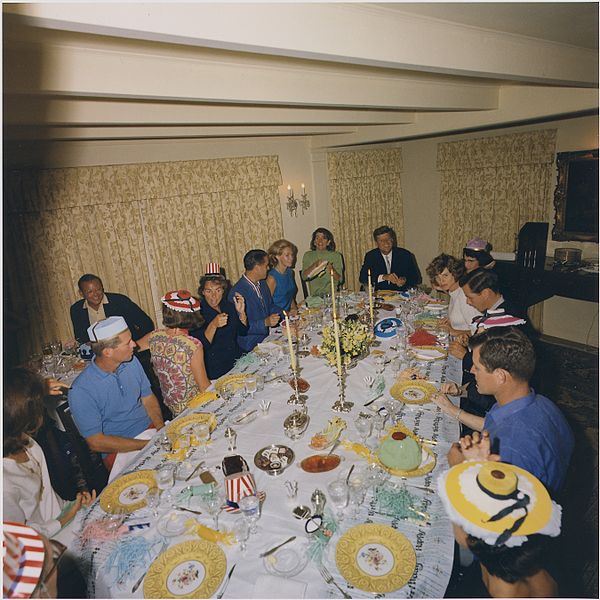John F. Kennedy’s many lifetime secrets are common conversation today, but the story of his oldest and dearest friend’s sexual orientation is largely unknown
“Here is a bulletin from CBS News. In Dallas, Texas, three shots were fired at President Kennedy’s motorcade in downtown Dallas. The first reports say that President Kennedy has been seriously wounded by this shooting.”
Fifty years ago this month, on the afternoon of November 22, 1963, Lem Billings had just returned from lunch when he heard the news. He was an advertising executive at Lennen and Newell in New York and as he approached his office building at 380 Madison Avenue, Billings saw immediately that something was wrong. Waves of people rolled out of the building onto the street, some looked confused, others wept. According to David Pitts, author of Jack and Lem: The Untold Story of an Extraordinary Friendship, a face in the crowd approached Billings and said, “I’m so sorry about the president.”
John Kennedy kept many secrets during his lifetime: poor health, drug use, and countless affairs with women. But one secret is still largely unknown today: Kennedy’s oldest and dearest friend, Lemoyne Billings, was a gay man.
Why would Kennedy risk having a gay man as his closest friend? According to Pitts, Ben Bradlee, former executive editor of the Washington Post and JFK friend, said Kennedy thought he could take care of any political damage that might occur, including a possible “outing” of Lem. “(JFK) thought he could handle anything.”
Lem Billings and Jack Kennedy met as teenagers at Choate, a prep school in Wallingford, Connecticut, where they were boarding students. Neither boy took the rules and traditions of the school very seriously. Jack was still in the shadow of his older brother, Joseph P. Kennedy, Jr. For now, Jack would coast on his considerable charm and goodwill. Lem too, got by academically without too much effort or ambition.
As a teenager, Jack seemed to go from one illness to the next, usually involving stomach and back ailments. In early 1934, while at Choate, Kennedy became seriously ill. According to Billings, Jack had contracted a blood condition that almost took his life. Jack’s mother, Rose, never visited him while at Choate. It was left to Lem to care for Jack, cheering him up, getting him books and talking to him late into the night. “We used to joke about the fact that if I ever write a biography, I would call it John F. Kennedy, A Medical History. At one time or another, he really did have almost every medical problem — take any illness Jack Kennedy had it,” Lem recalled later. This intimate caretaking, when both boys were away from parents, was a major factor in their lifelong loyalty to each other.
There was however, one problem, Lem was falling in love with Jack. By senior year, they were roommates and Lem’s desire for Jack was too powerful for him to ignore. He wanted to tell Kennedy but didn’t know how. Pitts describes what happened next: “There was an unspoken tradition at Choate … boys who wanted sexual activity with other boys … exchanged notes written on toilet paper … Toilet paper was used because it could be swallowed or easily discarded to eliminate any paper trail.” Lem sent the toilet paper note. Jack wasn’t interested. While he was recovering from another illness at a hospital in Rochester, Jack sent a letter to Lem full of news about his medical condition. Almost as an aside, he included the following line, “Please don’t write to me on toilet paper anymore. I am not that kind of boy.”
“ There was an unspoken tradition at Choate … boys who wanted sexual activity with other boys … exchanged notes written on toilet paper … Toilet paper was used because it could be swallowed or easily discarded to eliminate any paper trail. ” — From David Pitt’s ‘Jack and Lem’
Kennedy’s rejection failed to cause even the smallest change in their relationship. As far as anyone knows, the matter was never discussed again.
Given John Kennedy’s powerful attraction to women, it is noteworthy that all of his closest friendships were with men. “We don’t really have a word for that … for a man who relates to one sex sexually but the other emotionally. Of course, this was a time when women were seen as sex objects, perhaps it was not that unusual at the time to use women for sexual purposes and discount them in other ways,” says Pitts.
When Jack married Jackie Kennedy, Lem was never far away. Though they developed a warm relationship, it sometimes frustrated Jackie that she had to share her husband with Lem. Even in the White House, he had his own room and often showed up unannounced on weekends. His presence was a tonic for Jack, who almost never discussed politics with Lem. Instead, they laughed and gossiped. When Jackie declined to go on foreign trips, Lem went along as he did to Berlin when Jack made his famous “Ich bin ein Berliner” speech.
Lem was extremely careful to hide any sexual encounters he had in order to protect the president. While he had lovers, there is no evidence of a long-term relationship.
Even though his romantic feelings were never requited, Lem’s devotion to Jack remained complete until the day of the assassination. Boston University Professor James Whalen calls Lem’s life a cautionary tale, “If you devote your life entirely to someone else, is it worth the price? I would argue, no.” [x]









